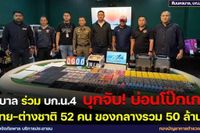Bangkok, Thailand, has once again found itself at the center of controversy following a police raid targeting illegal poker activities. On March 4, 2025, Thai authorities detained over 50 players during a coordinated operation, highlighting the nation's stringent stance against gambling.
The raid occurred at about 9:00 PM on Soi Phra Khanong Tai, located within the Khlong Toei district of Bangkok. Police officials had received tips from informants about illicit poker games happening at the site, leading to the swift intervention. Upon arrival, they discovered dozens of individuals engaged in illegal poker, which is classified as unlawful gambling under Thai law.
Among the 52 players arrested were citizens from 11 different countries, with many coming from Vietnam, Israel, Belarus, Pakistan, Denmark, India, China, Singapore, Iceland, and Russia. The involvement of international players reflects the global appeal of poker, but it also raises questions about the underground gambling scene thriving within Thailand.
According to sources from khaosodenglish.com, police seized significant evidence during the raid. Authorities confiscated three poker tables, 66 decks of playing cards, two laptops, and poker equipment, including storage cases and chips of various colors. The operation resulted in the seizure of 320 poker chips, each valued at 100,000 baht (approximately 3,000 USD), leading to total chips valued at 32 million baht (around 960,000 USD). Further cash seized included 315,000 baht, 1,900 USD, and even 100 yuan, bringing the overall value of the confiscated items to roughly 51.5 million baht, or 1.5 million USD.
During the interrogation process, all detainees admitted to participating in the illegal gambling operation. Individuals stated they had been invited to the gaming venue by Thai players they encountered during international poker tournaments, signifying how networks for illicit gambling can extend far beyond local bounds.
The legal repercussions for involvement in such illegal gambling activities are severe. Following the raid, the police confirmed 51 individuals are facing charges for participating, with the manager of the location likely to face additional charges for organizing the poker games. Under Thai law, gambling can result in significant fines or imprisonment for up to two years. These stiff regulations are part of the government's broader efforts to curb illegal gaming and enforce stricter policies around gambling.
This incident not only highlights Thailand's continuing battle against illegal gambling but also raises discussions about the efficacy of the existing laws. Despite frequent raids, the allure of underground poker rooms remains strong among both locals and tourists, underscoring the complexity of gambling culture within the country.
Authorities are likely to continue monitoring and conducting raids at suspected gambling locations, but as long as there is demand for underground games, such efforts may only yield temporary results rather than complete eradication of illegal gambling.
Interestingly, reactions from those arrested reveal their awareness of the risks involved but suggest a disregard for the legal boundaries. One player expressed it succinctly: "We knew it was illegal, but the thrill of the game was worth the risk." This sentiment may lament the possibility of significant cultural shifts or changes needed to alter perspectives on gambling.
For now, the fate of the arrested individuals remains uncertain as they navigate the legal system. With heavy penalties hanging overhead and the allure of underground gambling persistent, it is clear Thailand's struggle with illegal gambling will continue to be both challenging and contentious.


